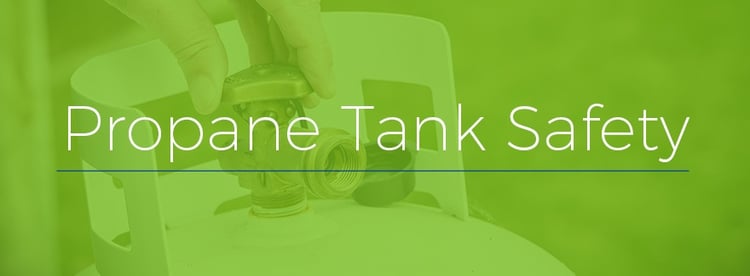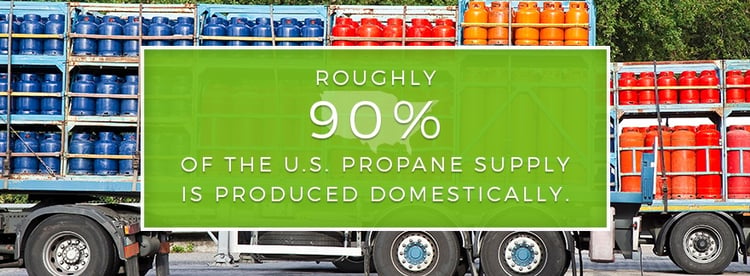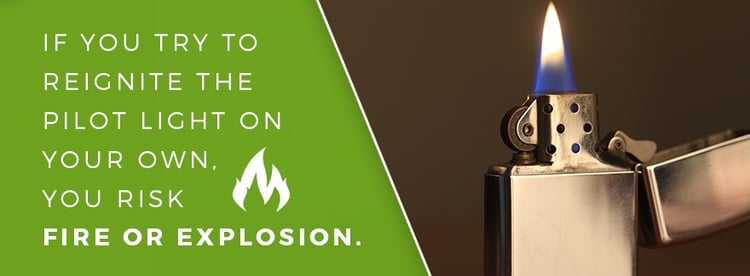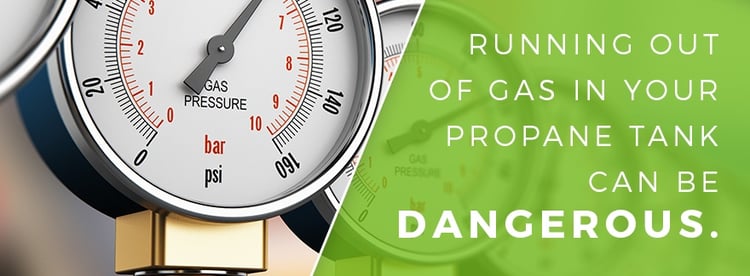
At Smart Touch Energy, we prioritize propane tank safety. Let's take a closer look at some of the key questions surrounding propane tank safety and how you can minimize propane tank dangers.
- What Should You Do If You Smell Propane?
- How Can You Test a Propane Tank for Leaks?
- How Should You Handle a Propane Gas Appliance?
- What Should You Do With a Leaky Propane Tank?
- How Should You Store Your Propane Tank?
- How Can You Transport a Propane Tank Safely?
- Do You Need an Overfill Prevention Device for Your Propane Tank?
What Is Propane?
Propane, also referred to as liquefied gas, is a popular fuel choice for individuals and businesses. It is delivered as a liquid and pumped into a storage tank, and it will not ignite with air until the ignition source reaches at least 920°F.
Furthermore, propane is 270 times more compact as a liquid than as a gas. As such, propane is easier to transport and store as a liquid than as a gas.

According to the National Propane Gas Association (NPGA), roughly 90 percent of the U.S. propane supply is produced domestically. The NPGA points out that propane serves many purposes, including:
- Commercial, residential and recreational usage
- Combustion engine usage
- Chemical, industrial and utility usage
- Agriculture and miscellaneous usage
The U.S. Energy Information Administration reported U.S. propane and propylene inventories hit 97.7 million barrels in September 2015 — their highest level in 22 years. This indicates the demand for propane is on the rise in the United States, a trend that may continue in the foreseeable future.
What Should You Do If You Smell Propane?
On its own, propane gas is non-toxic. It produces minimal emissions and is not harmful to soil or groundwater. It also is colorless and odorless, but many propane suppliers will add a chemical compound to give propane an unpleasant smell. By doing so, propane suppliers help alert customers if a propane tank leaks — which can be a major safety hazard.
A residential propane tank that leaks may emit gas quickly. Fortunately, the following steps will ensure you are fully prepared to handle this scenario:
- Extinguish all open flames and smoking materials immediately.
- If possible, turn off the valve on your residential propane tank by turning it to the right, or clockwise.
- If the odor worsens, cover the residential propane tank with a wet cloth, exit the area and call 911 or your local fire department.
- Don't just reuse the propane tank. Instead, have a propane supplier inspect the tank to ensure it is safe for use.
When it comes to propane tank safety, it is always better to err on the side of caution. Thus, if you smell gas, you'll want to act fast to minimize this danger. Otherwise, you may put yourself and others at risk.
In addition, it is important to note that some smell sensitivities or medical conditions could make it difficult to detect propane. In these cases, a gas detector for propane may prove to be valuable, as it will provide an additional layer of security.
Don't forget to turn off your propane tank any time it is not in use. Keep any flammable items away from your residential propane tank as well.
Another element to keep in mind when it comes to propane tank safety is odor fade, or the unintentional reduction of propane odor concentration. One reason odor fade may occur is due to water, rust or air inside a propane tank. Additionally, odor fade may happen because the odor can stick to areas such as distribution and piping systems, as well as simply to the inside of the tank. Although this problem is rare, it may affect propane tanks that have been sitting too long before being filled.
How Can You Test a Propane Tank for Leaks?
To test a propane tank for leaks, you'll want to conduct a simple "bubble" test that consists of the following steps:
- Apply a layer of soapy water or a leak detector solution to the connection between the residential propane tank's cylinder valve and regulator outlet.
- Open the cylinder valve slowly and check for bubbles.
- If you discover bubbles, close the cylinder valve, tighten the connection and repeat the testing process. If bubbles continue to appear, it means there is a leak in the propane tank.
Contact your propane supplier if you identify a leaky residential propane tank. They can help you resolve the issue.
How Should You Handle a Propane Gas Appliance?
You should handle a propane gas appliance with care, and here are several tips to help you do just that:
- Use Propane Grills Outside Only: Never use a propane grill indoors — without exception.
- Avoid Space Heating Propane Grills or Ovens: Although space heating propane grills and ovens may seem like viable options at first, they can be dangerous.
- Avoid Using Portable Electric Generators Indoors: Keep a portable electric generator outside of a building at all times.
- Work With a Qualified Propane Service Technician: A qualified propane service technician can connect an appliance to a propane tank and perform the necessary assessments to ensure you can maximize the value of your appliance.
If you are ever uncertain about how to take care of a propane gas appliance, you can contact the appliance provider for extra assistance. This company will be able to address any of your concerns and questions and help you use your appliance safely.
How Should You Maintain a Propane Gas Appliance?
A propane gas appliance requires maintenance, and some of the best ways to ensure your appliance will maintain its quality and performance include:
- Inspect Old Appliance Connectors: If an appliance is more than 20 years old, have a qualified service technician assess the appliance connector. If you try to do this on your own, you risk damaging the connector and causing a propane gas leak. If you work with a service technician, however, you may be able to avoid risk and bolster your appliance's performance for years to come.
- Check the Appliance Vents: Let the vents on your appliance breathe and ensure flue gases can flow easily to the outdoors. Remove any insects, bird nests or other debris from the vents. Clear the area around the appliance to ensure plenty of air can reach the burner for proper combustion.
- Don't Repair or Modify the Appliance on Your Own: If you attempt to modify, repair or replace an appliance connector, control, regulator or valve on your own, you risk causing a gas leak.
Propane tank safety extends beyond the tank itself, and those who focus on finding ways to take care of their propane gas appliances can manage risk like never before.
Of course, working with a qualified propane appliance service technician can help you keep your appliance in working order. This technician possesses the training and know-how needed to fix or upgrade an appliance safely.
What Should You Do If There Is a Problem With Your Propane Tank and/or Outdoor Appliance?
A propane tank is complex, and you should never modify a propane tank on your own. If you believe your propane tank is defective, don't try to modify or repair regulators, valves or other propane tank parts if you lack the proper training and expertise.
On the other hand, you may believe your outdoor appliance is problematic. Like propane tanks, outdoor appliances are intricate, so you may want to get expert help with appliance repairs.
Sometimes, the pilot light on an outdoor appliance may go out. If the pilot light goes out periodically, you should follow the appliance manufacturer's instructions to reignite it correctly. Follow the instructions closely and review any safety warnings before you attempt to reignite the pilot light.
If an outdoor appliance's pilot light goes out frequently, it likely indicates there is an issue with the appliance, and you should avoid the temptation to reignite the pilot light on your own. In this case, you should get expert help to reignite the pilot light.

If you try to reignite the pilot light on your own, you risk fire or explosion. Comparatively, a qualified propane service technician will do everything possible to fix the pilot light on your appliance and ensure the problem does not occur again.
Any time you have concerns or questions about a propane tank and/or outdoor appliance, reach out to your propane supplier and/or a qualified gas service technician for support. This will allow you to get the expert assistance you need and avoid putting yourself or others in danger.
What Should You Do With a Leaky Propane Tank?
If you find a propane tank leaks, you should never refill it. You’ll need to get the tank inspected by a qualified propane gas technician before it can be refilled.
It is against the law to refill a tank if it’s out of date. The most recent inspection date of a propane tank is printed on the side of the tank, and you should review this information before you try to have your tank refilled.
The law requires periodic inspection of propane tanks, and you should evaluate a propane tank at least once a month to identify any leaks. Remember, a diligent approach to propane tank safety can make a world of difference. If you allocate even a few minutes each month to inspect your propane tank, you can manage propane tank safety risks effectively.
How Can You Dispose of a Leaky or Out-Of-Date Propane Tank?
You should never throw a propane tank away. Conversely, many municipal programs offer propane tank collection in cities and towns nationwide. Or, your propane supplier should be able to offer additional support so you can dispose of your propane tank properly.
How Should You Store Your Propane Tank?
How you store your residential propane tank is paramount. If you store your propane tank correctly, you will be able to reduce the risk of causing a leak.
Here are several tips to ensure you can store your propane tank safely:
- Avoid Indoor and/or Enclosed Areas: You should never store your propane tank indoors or in an enclosed area like a basement or shed.
- Avoid Excess Heat: Heat builds up inside of a propane tank, and when this happens, the tank's pressure relief valve may release propane. Therefore, you'll want to keep your residential propane tank away from areas where temperatures reach 120°F or higher.
- Disconnect the Propane Tank When Not in Use: A common scenario you might see is a propane tank connected to a barbecue. However, when the propane tank is not in use, ensure it’s disconnected from the barbecue or other appliance.
You should always store your propane tank outdoors and keep it in an upright position away from heat and direct sunlight. If you intend to use a propane tank that has been stored for a long time, be sure to look for signs of aging on the rubber tubing that links the propane tank to an appliance. If the rubber tubing is broken or cracked, you can replace it by purchasing new rubber tubing from a hardware store.
How Can You Transport a Propane Tank Safely?
If you decide to move your residential propane tank from one location to another, it is essential to do so safely.
You should always move a propane tank in standing position. Ultimately, you'll want to secure the propane tank with rope — not a metal chain. A metal chain could move around against the metal propane tank, creating sparks that could be disastrous. Meanwhile, rope is strong and sturdy and will help you keep the propane tank in place consistently.
When you travel, keep the windows of your vehicle open for added safety. You also will want to ensure the propane tank valve is locked and covered with a dust cap. And if the propane tank needs to be refilled, visit a filling station before you reach your final destination.
What Should You Do If You Run Out of Gas?

Believe it or not, running out of gas in your propane tank can be dangerous. Some of the most common problems that may arise due to an empty propane tank include:
- Leaks: If the appliance valve or gas line of a propane tank remains open after the propane supply runs out, a leak may occur when the tank is refilled.
- Rust Build-Up: Air and moisture can accumulate inside of an empty propane tank. This can result in rust build-up inside the propane tank, lowering the concentration of the odor of propane and making the gas more difficult to smell.
- Fires and Explosions: After a propane tank runs out of gas, the pilot light on an appliance may go out, creating fire and explosion dangers.
If the fuel level on your propane tank falls below 20 percent, you should contact your fuel supplier for a refill. Setting up regular propane deliveries also may provide immediate and long-lasting benefits. The deliveries will ensure you'll always have a full supply of propane on hand, so you'll be able to use propane any time you choose.
Do You Need an Overfill Prevention Device for Your Propane Tank?
Your propane tank should be equipped with an overfill protection device (OPD) — and for good reason.
An OPD prevents a propane tank from being overfilled. If a propane tank is overfilled, the tank won't have sufficient space if liquefied gas expands in warm temperatures. As a result, a propane tank's cylinder pressure will increase, which can create dangerous conditions.
Many propane tanks have OPDs that are easy to find. The devices feature triangular handwheels with the letters "OPD" on them.
Choose Smart Touch Energy for Propane
Smart Touch Energy empowers customers with propane tank safety knowledge and insights. We also take the hassle out of ordering propane and help customers purchase energy products in an easy, convenient and cost-effective way.
Find out how much you can save with Smart Touch Energy as your exclusive propane supplier — check out our propane prices online today.




